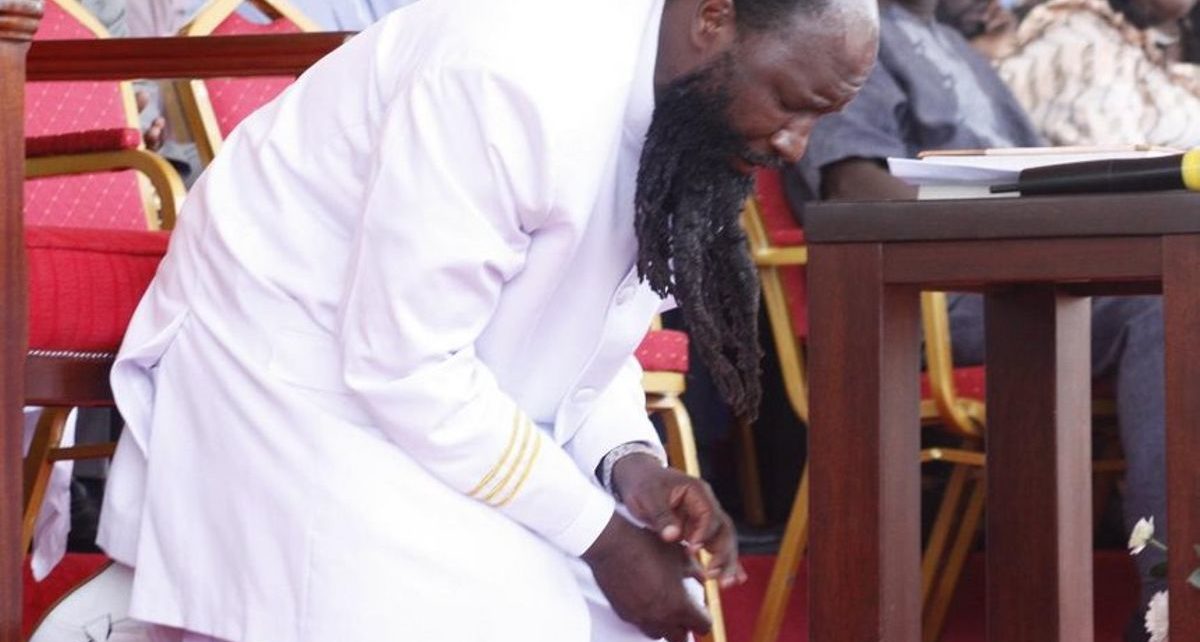They must dress different and colours play a huge part in spreading the gospel, planting seeds and sleeping with choir girls
By Mbatia wa Njambi
Visiting Thinker
@Undercover KE
Men of God have to look different from those seeking God. They know God more, so their dressing has to reflect that proximity to the Kingdom which is not of this world. After all, the shepherd doesn’t have to wear the same wool as the sheep and not necessarily to appear sheepish.
Then there is that small matter of the pulpit.
It is the centre piece of the church, tent or the open grounds from where the good world is delivered. The pulpit is normally slightly elevated. The idea is the communal proclivity to look up and know-as a sinner- you’re not of this world.
Looking up means there is someone holding their attention- the pastor, who most of the time foams at the mouth trying to win souls.
The pastor is either in a shiny off-white suit, luminous yellow or screaming red outfit. Never a charcoal black or grey suit like a banker! The shoes, mostly moccasins are also of a screaming colour and so are the ties.
With these colour regimes in preaching fashion, pastors achieve what is called the ‘Placebo-Effect’ which is the effect of colour on our senses: It is the reason why kindergarten colours are bright and smiley, why capsules are red or yellow and why cops are the boys in blue. Have you ever seen a black fire extinguisher?
For a pastor to have a ‘Placebo-Effect’ on worshipers the dress code must be different and colours play a huge part in spreading the gospel, planting seeds and sleeping with the choir girls, especially those cute sopranos at the front.
The overall look akin to a bleached Congolese musician means the pastor could be having three qualifications
Here is what dressing says about the man of God…
The suits could also be in screaming yellow or luminous blue. They are accentuated by excellent barbing of hair that has a lot of greasy gel. That provides excellent optics for televangelism especially when accompanied by theatrical preaching, speaking in tongues and breaking into hymnal trances. These suits are mostly worn by pastors from churches propagating prosperity gospel-the living of the high life here and now.
Shiny suits mean several things. The pastor and other partners-in-crime sat down and wrote a business plan.
Shiny suit pastors have churches with names like: Armpit of God Ministries. The Thorax of Disciples. The High Commission of Christ. The Embassy of Heavenly Fire. The Ankles of Nazareth Temple. The Ambassadors of Calvary.
The church, mostly in a big white tent, has no dogma per se. It doesn’t stand for anything theologically. Image is everything. Dress to impress. The overall look akin to a bleached Congolese musician means the pastor could be having three qualifications: knowledge of mother tongue, English, Kiswahili and ownership of a leather-bound bible-weather beaten or not.
This shiny suits and white pointed shoes pastors can preach for hours on end and you wouldn’t realize they have just quoted two verses.
Majority of their followers are mostly not the kind who experienced the presidency of the late unlamented, Daniel arap Moi. He was the head of state when Kenya accepted Structural Adjustment Programs (SAPs) from the World Bank and the International Monetary Fund (IMF) in the early 1980s and whose effect was felt in the early to mid-1990s.
SAPs meant the government stopped funding social services like health and education. There was massive brain drain as doctors and nurses resigned, took jobs abroad. Medical services in government hospitals deteriorated. Doctors who remained in Kenya opened private clinics.
The future appeared bleak and into this set of circumstances came liberators in preachers of prosperity gospel
There was no money to pay teachers. Many were retired. Schools were congested, teaching standards plummeted. Companies sacked workers. School dropouts increased and so did crime levels.
The government being the biggest employer was not left behind. It laid off hundreds of thousands of civil servants in an early retirement package dubbed ‘Golden Handshake.’
It was catastrophic. Many ‘Golden Handshake’ retirees pumped their windfalls in businesses they had no idea about. One hero bought land in rural Kitui and opened a bar and lodging. Most times he was the sole drinker and his barmaids the only clients in the lodgings! Then money ran out and his daughters began dating opportunistic makangas in Buruburu route 58.
There was no money in Kenya. The future appeared bleak and into this set of circumstances came liberators in preachers of prosperity gospel. They gave the people hope and religion being the opium of the masses; they filled churches by the truckloads.
Unlike mainstream churches, their form of evangelism did not scare the faithful with preaching about fire, brimstone and gnashing of teeth in the hottest part of hell.
Their preaching featured live electronic music, not choirs with shakers, cow bells and the kayamba. There were miracles, healing the sick. Prosperity was a key theme of crusades where material wealth and physical well-being was lumped with biblical teachings that financial blessing was the will of God for Christians.
The attendees could clearly see that the young preachers driving nice cars, wearing shiny suits and white pointed shoes were truly blessed. They lived large, had beautiful wives and children with dimples and corn rowed hair. There was nothing like ‘the poor shall inherit the earth.’
Prosperity gospel was not planted in leafy suburbs like Muthaiga where residents were already loaded. The preachers were wise enough to know their customers were in Eastlands where people aspired for instant coffee solutions to their depravity.
Pastors in shiny suits are also case studies in ‘pastor-preneurship’ of spotting gaps in the religious market
Preaching theatrics demanded that the pastor in white pointed moccasins had to continuously wipe their brow with a white hand towel. Even today, their jokes are animated. The towel comes in handy when shedding tears for Jesus Christ who was nailed on the cross to cleanse our sins.
The bling-bling like those you see on gold scammers could mean the pastor has very little theological grounding. The purpose for taking to preaching might include long stretches of unemployment. To maintain those shiny suits which made to measure means the faithful have to ‘plant a seed’, dish out generous offering and engage in overzealous tithing.
Eminent economist David Ndii observed on his Twitter handle this year “the prosperity gospel explains poverty and illness in terms of sins against God, specifically the withholding of tithes.”
Indeed, pastors in shiny suits are also case studies in ‘pastor-preneurship’ of spotting gaps in the religious market and turning them into business opportunities which might also include dressing to attract single choir girls and grieving widows. After all, some of their churches are in hotel conference halls…
Married pastors have their photos alongside their wives at the entrance on the main road leading to the church, which as earlier mentioned could be a tent on hired grounds.
These pastors must thus be on Facebook, Twitter and Instagram. Their churches have Telegram groups considering that Millennials, the other source of clients for these pastors, are attracted to hippy pastors in shiny suits, white pointed shoes and who are on social media platforms.


Great content! Super high-quality! Keep it up! 🙂
I really like how you wrote about Why Kenyan pastors love shiny yellow suits &
luminous red shoes! –.
An interesting discussion is definitely worth comment.
I think that you ought to publish more on this subject matter, it might
not be a taboo subject but typically folks don’t
discuss such subjects. To the next! Many thanks!!